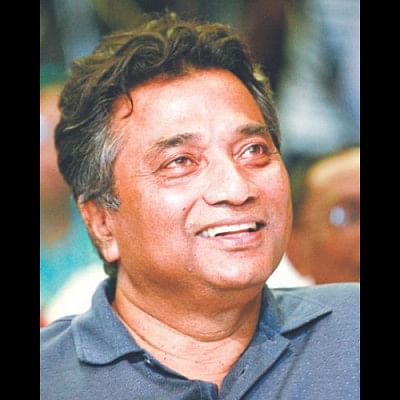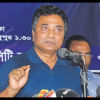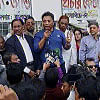Of a dynamic city mayor, his dreams

He worked tirelessly and was planning to do more to realise his dream of making Dhaka a modern city, but death has halted that mission.
The demise of Dhaka North City Corporation Mayor Annisul Huq has also cast doubt on the completion of his unfinished tasks.
Many of his colleagues and well-wishers were still struggling to come to terms with the death of such a dynamic man like him.
"When I heard the news [about the death of Annisul], I first thought it was not true. I still can't believe he has left us so early," said Mohammad Salimullah, a resident of Kamalapur.
"He has done so many splendid jobs for Dhaka city in just half of his five-year tenure," he said.
After assuming the office of the DNCC mayor on May 6, 2015, Annisul took various steps to turn the city greener, cleaner and free from pollution and traffic congestion.
His most appreciated works included removal of unauthorised billboards, and prevention of illegal car parking surrounding the bus stops in Gabtoli, Mohammadpur, Mohakhali and Kalyanpur areas, easing the traffic situation in those areas to a great extent.
His clearing of the Satrasta intersection in Tejgaon is also worth mentioning.
Before the drive, there was hardly anyone who thought an illegal truck stand, which occupied both sides of a road and caused terrible traffic jam in the area for decades, could ever be removed because of strong opposition from local influential transport leaders.
The city corporation, led by Annisul, later planted trees on the median strip as part of beautification and also built a modern public toilet beside the road.
Now, many city dwellers prefer using the street, considering it safe and less congested. It is not long ago when the entire area was frequented by drug peddlers and other criminals, and people tried to avoid the place after sunset.
Before becoming sick, Annisul was planning to introduce 5,000 new buses, to be run by five to six operators, as part of a DNCC project to improve the city's public transport system.
A feasibility study was carried out around three months ago. A relevant presentation was done at the Prime Minister's Office and a direction was given to execute the project later.
Annisul was also planning to construct several Uloops from Mohakhali to Gazipur's Joydevpur so that traffic could move smoothly. The city corporation was acquiring land for that purpose.
For the city dwellers, digging is a common nuisance and the same road is cut several times a year by different service providers. To stop the practice, Annisul tried his best to set up a combined duct system in Dhaka, like that in other smart cities.
The project is said to be at the final stage.
"He had a vision about Dhaka city," local government expert Prof Tofail Ahmed said, adding that unlike many politicians, Annisul used to consult relevant professionals, including urban researchers, architects and planners, to educate himself before undertaking any public service scheme.
“It is a trait rarely seen among our political leaderships.
"He was always focused on his work instead of remaining busy pleasing political masters," he added.
Expressing deep shock at the early demise of the mayor, eminent urban expert Prof Nazrul Islam said Annisul came as a blessing to Dhaka city.
"He was a man from a different background as he was involved in business and media. But he showed success as a mayor,” said Prof Nazrul, also the honorary chairman of Centre for Urban Studies.
Architect and Member Secretary of Bangladesh Poribesh Andolon Iqbal Habib, who worked closely with the mayor, said Annisul's death cast doubt on all his unfinished jobs.
Annisul seemed to be a tech-savvy person as he wanted to reach city dwellers through a mobile app, he said.
“He planned to develop an app through which citizens could lodge their complaints with the DNCC," he said, adding that the app, being developed by Bangladesh University, also aimed at ensuring accountability of the officials concerned.
"If any official fails to solve any problem in three days, the app would alert his higher officials. The mayor would step in if the higher officials too fail to address the issue in seven days," said Iqbal, adding that he was not sure whether the project would ever be completed.
Annisul also had plans to protect the water bodies in the city and complete three projects similar to the Hatirjheel project.
Another laudable job of the mayor was his campaign for making the city greener, he said, adding that the mayor worked with several organisations to promote roof gardening.
Annisul took an initiative to plant five lakh trees within his tenure. He could plant around 70,000 trees at different places, said a DNCC official.
Again, he employed consultants to modernise 87 parks in the capital and approved designs of three parks -- two in Banani and one in Mohammadpur, said Iqbal.
Annisul also worked to construct roads, modernise footpaths and develop a storm drainage system in Gulshan-Banani-Baridhara areas.
Giving priority to pedestrians, he ensured that pavements, including many in the diplomatic enclave, were freed of illegal occupation.
He also had initiated a Tk 1,026 crore project to build more roads, footpaths and drains in others areas, including Mohammadpur, Mirpur, Pragati Sarani, Karwan Bazar and Rampura.
The first phase of the project is expected to end by April next year, said the DNCC official, adding, "The areas will change drastically once the project ends."
To improve the garbage management, Annisul set up many secondary transfer stations at different places of the city, said another city corporation official.
For example, around 10 garbage containers used to be placed on the busy Taltola Street in Mirpur. However, he managed to get a piece of land at the Parade Square area and set up a secondary transfer station there. That changed the appearance of the area near Taltola bus stop, said DNCC officials.
Prof Nazrul acknowledged the move and thanked Annisul for that.
Besides, the mayor worked hard to ensure a modern Nagar Bhaban for the DNCC, said his colleagues.
Talking to The Daily Star yesterday, Arifa Monjoor, who lives in Gulshan, said Annisul became a household name because of his dynamism as a mayor. "I don't know whether any other mayor of Dhaka did so much for the city."
At the age of 65, he lost the battle for life in a London hospital on Thursday, after nearly three months' treatment there for neurological problems.
His family members said his body would reach the Dhaka airport around 11:40am today. From there, the body would be taken to Annisul's Banani home and then to the army stadium around 3:00pm so that people could see him for the last time.
His namaz-e-janaza will be held there after Asr prayers. He will be buried beside the graves of his mother and son at the Banani graveyard.

 For all latest news, follow The Daily Star's Google News channel.
For all latest news, follow The Daily Star's Google News channel. 








Comments